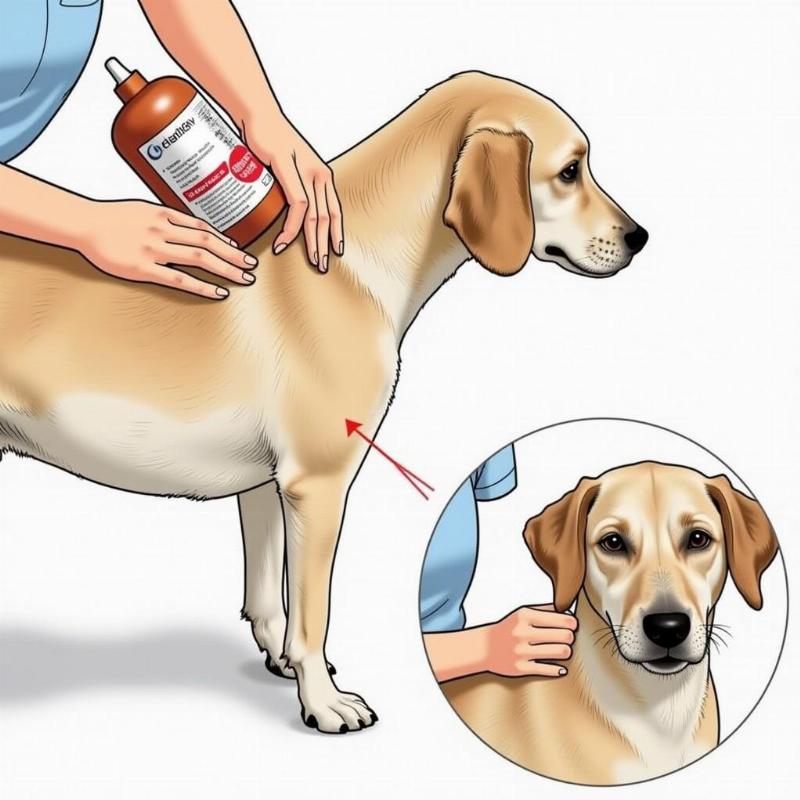Protecting your furry friend from heartworm, fleas, and ticks is a crucial part of responsible dog ownership in the US. These parasites can cause serious health problems, ranging from skin irritation to life-threatening diseases. This comprehensive guide will equip you with the knowledge and resources you need to implement an effective dog heartworm, flea, and tick control strategy.
Understanding the Threats: Heartworm, Fleas, and Ticks
Heartworm disease, transmitted by mosquitoes, can severely damage a dog’s heart, lungs, and other organs. Fleas, on the other hand, cause intense itching and can lead to allergic reactions and secondary infections. Ticks transmit a variety of diseases, including Lyme disease, ehrlichiosis, and Rocky Mountain spotted fever, posing significant risks to both dogs and humans. Choosing the right preventative measures is vital for protecting your canine companion.
Heartworm Prevention: Safeguarding Your Dog’s Heart
Heartworm prevention is a year-round necessity in most parts of the US. Preventatives come in various forms, including chewable tablets, topical solutions, and injections. Consult your veterinarian to determine the best option for your dog’s breed, age, and lifestyle.
Flea and Tick Control: Protecting Against Itchy Bites and Dangerous Diseases
Several flea and tick control products are available in the US, ranging from topical treatments and oral medications to collars and shampoos. Consider factors such as your dog’s environment, activity level, and any sensitivities when selecting a product.
Choosing the Right Preventatives: A Veterinarian’s Perspective
Dr. Emily Carter, DVM, a practicing veterinarian in Austin, Texas, emphasizes, “It’s crucial to consult with your veterinarian to determine the most appropriate heartworm, flea, and tick preventative for your dog. Factors such as your dog’s breed, age, lifestyle, and existing health conditions should be considered.” A tailored approach ensures optimal protection.
Integrating Preventatives into Your Dog’s Routine
Making heartworm, flea, and tick prevention a regular part of your dog’s routine is key to its effectiveness. Set reminders on your phone or calendar to ensure you administer medications on schedule.
 Applying flea and tick treatment
Applying flea and tick treatment
Beyond Preventatives: Environmental Control
While preventatives are crucial, environmental control plays a vital role in minimizing parasite exposure. Regularly cleaning your home, washing your dog’s bedding, and maintaining a tidy yard can significantly reduce flea and tick populations.
Recognizing the Signs of Infestation
Early detection is key to treating infestations effectively. Be vigilant for signs of fleas and ticks, such as excessive scratching, hair loss, and visible parasites. If you suspect your dog has heartworm, consult your veterinarian immediately for testing and treatment options.
Dr. Carter adds, “Regular veterinary check-ups are essential for detecting heartworm disease early. The sooner treatment begins, the better the prognosis for your dog.”
Conclusion: Prioritizing Your Dog’s Health
Protecting your dog from heartworm, fleas, and ticks is a cornerstone of responsible pet ownership in the US. By understanding the risks, choosing appropriate preventatives in consultation with your veterinarian, and implementing environmental control measures, you can safeguard your furry companion’s health and well-being. Don’t wait, start protecting your dog today.
FAQs
- How often should I give my dog heartworm medication? Most heartworm preventatives are administered monthly.
- What are the signs of a flea infestation? Excessive scratching, hair loss, and small black specks (flea dirt) on the skin are common signs.
- Can I use human flea and tick products on my dog? No, human products can be toxic to dogs. Always use products specifically formulated for canines.
- What should I do if I find a tick on my dog? Remove the tick promptly using tweezers, grasping it close to the skin.
- How can I prevent ticks in my yard? Keep your yard mowed short, remove leaf litter, and consider using tick control products designed for outdoor use.
- Are there natural flea and tick control options? While some natural remedies exist, their effectiveness may vary. Consult your veterinarian before using them.
- What are the symptoms of heartworm disease in dogs? Symptoms can include coughing, fatigue, difficulty breathing, and weight loss.
Beautdogs.us is your premier resource for all things dog-related in the US. We offer expert advice on dog breeds, grooming, training, nutrition, and overall wellness. Whether you’re a new dog owner or a seasoned pro, Beautdogs.us is here to help you navigate the joys and responsibilities of canine companionship. Contact us today for personalized support! Email: [email protected], Phone: +1 501-555-7529.